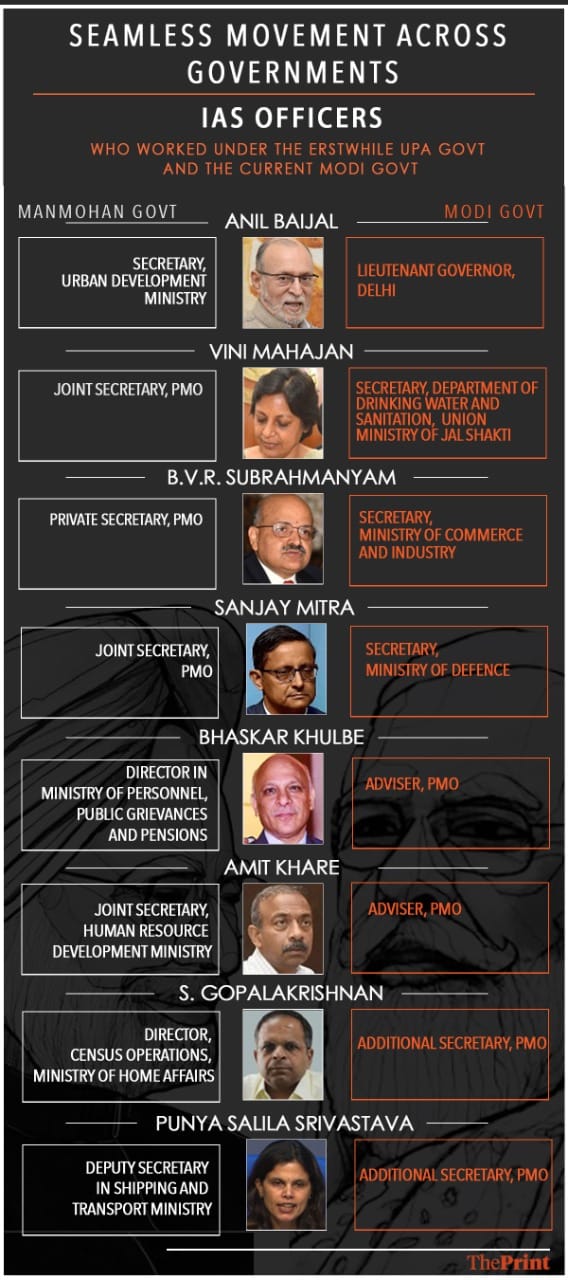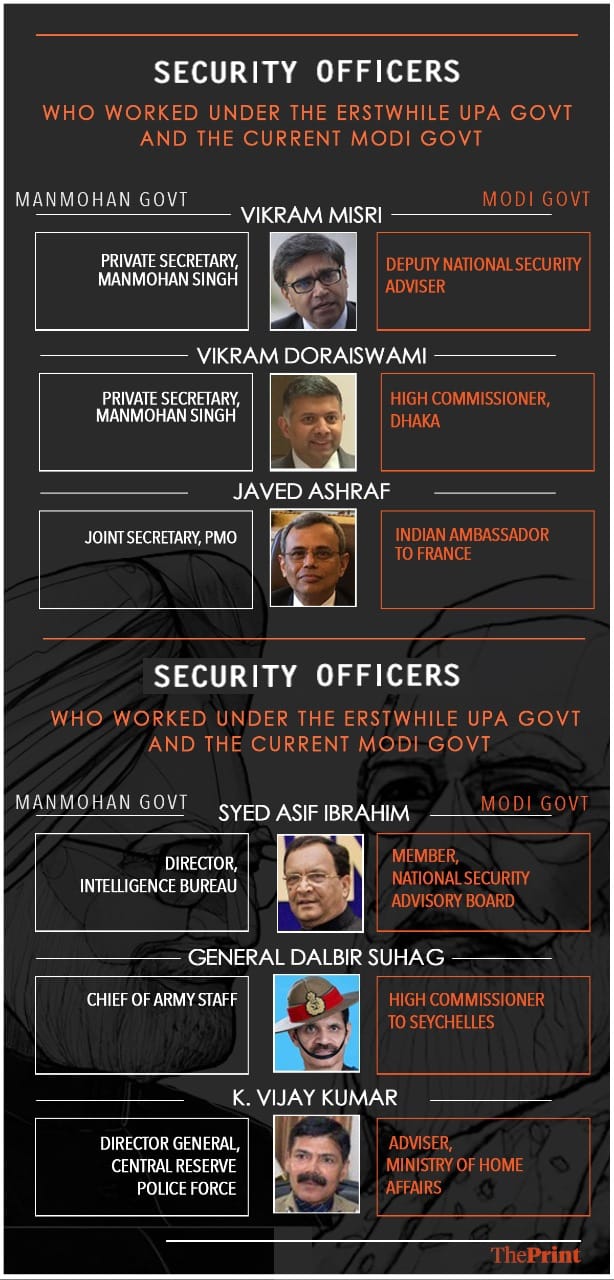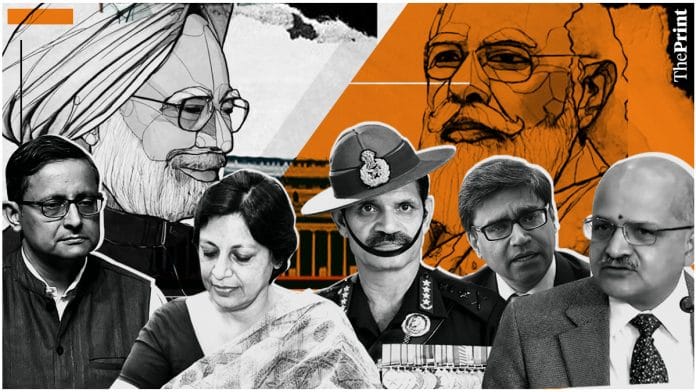New Delhi: The appointment of Punjab’s former chief secretary, Vini Mahajan, as secretary of the high-profile Union Jal Shakti Ministry shows Prime Minister Narendra Modi’s government has increasingly used a trove of bureaucratic jewels who were first mined by the Manmohan Singh government, an analysis of recent postings by ThePrint has revealed.
Apart from Mahajan, over a dozen civil servants from the administrative, foreign and security services who held high-profile positions in Prime Minister Singh’s government are now tasked with critical roles in implementing Prime Minister Modi’s keystone policies.
Mahajan has earlier served in New Delhi for eight years, between 2004 and 2012, seven of them in Manmohan Singh’s PMO as a joint secretary. Following a year as Punjab’s chief secretary — while her husband, Dinkar Gupta, served as the state’s director general of police — Mahajan has now been brought back to the national capital to push forward the successful Nal Se Jal Mission.
Her position will be even more crucial now that Bharat Lal, the PM’s long-trusted Indian Forest Service officer from Gujarat, who was driving Nal Se Jal since its launch in 2019, has moved as secretary to the anti-corruption watchdog, Lokpal.
The appointment is among a string that questions the criticism that Modi relies almost exclusively on a small circle of confidants he worked with while serving as Gujarat’s chief minister.
“Unlike the general perception that a particular cadre rules the PMO or only loyalists have an important role to play, there is a methodology that underpins the system,” said V. Ramani, a retired IAS officer who held several important positions under Manmohan Singh.
“Appointments primarily depend on efficiency and merits,” Ramani added. “Every PM and the other ministers want their work done. And it is not true that loyalty can outweigh merit. It does not work like that.”
Also read: Punjab Police file FIR in Modi security breach case, make no mention of blocking of PM’s convoy
The top officers
The list of key Modi administrators who honed their skills in the Manmohan Singh years has been growing steadily.
Several Modi-era civil servants — most visibly Anil Baijal, urban development mandarin under Manmohan Singh, and Lieutenant Governor of Delhi now — have risen to high-profile status, their prospects undimmed by perceived allegiance to past governments.
B.V.R. Subrahmanyam, who served in both tenures of the Singh government, was handpicked by Modi in 2014 and appointed as the chief secretary in the sensitive state (now Union territory) of Jammu and Kashmir. He is currently serving as the secretary of the Ministry of Commerce and Industry.
Similarly, West Bengal-cadre IAS officer Sanjay Mitra served as a joint secretary in Singh’s PMO, and then as the chief secretary in Chief Minister Mamata Banerjee’s government in Bengal, before returning to New Delhi in 2017, as highways secretary. He retired as defence secretary in 2019.

“These cases are not exceptions,” said a senior civil servant who didn’t wish to be named. “Amarjeet Sinha, a Bihar-cadre officer, held important positions in the UPA governments, and then became an adviser to the Modi PMO. The same is true of Bhaskar Khulbe.”
Khulbe, a West Bengal-cadre IAS officer, is now an adviser to the PM.
Amit Khare, a Jharkhand-cadre IAS officer, served in the UPA government as joint secretary of the Union Human Resource Development Ministry (now Education Ministry), from 2008 to 2014. He then went back to his cadre, and returned to the Centre to become secretary, HRD, in 2019. He is now an adviser in the PMO.
S. Gopalakrishnan, a Tamil Nadu-cadre IAS officer and an alumnus of the Indian Institute of Technology Madras and Indian Institute of Management Bangalore, who directed Census operations in the Ministry of Home Affairs from 2009-2013, now works in the PMO as additional secretary.
Punya Salila Srivastava, another additional secretary in the PMO, earlier held important positions in the UPA government, dealing with shipping and transport.
A retired civil servant, who served under both PM Modi and PM Singh, told ThePrint that “the bureaucrats who were trained in Dr Singh’s PMO or in key positions in his government have developed a reputation for administrative competence”.
A stand-out case of a civil servant enjoying a career across multiple governments remains that of Narendra Nath Vohra. He served as Jammu and Kashmir governor for 10 years, between 2008 and 2018, enjoying the confidence of both PM Singh and PM Modi. He had earlier served as principal secretary to PM I.K. Gujral, and had administrative leadership of the defence and home ministries.
Also read: ‘Not your jurisdiction’, SC tells Calcutta HC, orders ex-chief secy to appear for case in Delhi
India abroad
Like External Affairs Minister S. Jaishankar, who, prior to joining the Modi government, served as India’s foreign secretary and ambassador, several Indian Foreign Service (IFS) officers prominent in the Manmohan Singh years have grown in importance under Modi.
Deputy National Security Adviser Vikram Misri, who served as Singh’s private secretary, has had a stellar career under Modi, going on to become ambassador to China, before landing the national security posting.
Vikram Doraiswami, also Singh’s private secretary, is now high commissioner in Dhaka. Significantly, Modi’s focus on Bangladesh is well-known.
Javed Ashraf, who was joint secretary in Singh’s PMO, is ambassador to France now. He also participated in the sensitive negotiations to purchase the Rafale combat jets under the 2016 deal.
Syed Akbaruddin, the highly-visible MEA spokesperson during the UPA era, became India’s envoy to the United Nations under the Modi government.
The guard
Like their IAS and IFS counterparts, several Indian Police Service (IPS) and military officers who were prominent in the UPA set-up have also moved up the ladder under Modi.

Even though India’s national security czar, Ajit Doval, is believed to have had a fraught relationship with his one-time mentor and UPA National Security Adviser M.K. Narayanan, and had little role in the UPA himself after a brief stint as the Intelligence Bureau director, his picks for top offices do not seem coloured by that experience.
Syed Asif Ibrahim, director of the Intelligence Bureau from January 2013 to December 2014 — and the first and only Muslim to hold this post — was appointed special envoy for counter-terrorism, as the NSA’s de-facto number two. He retired from the position in 2019, and is now a member of the National Security Advisory Board.
Alok Joshi, secretary of the Research and Analysis Wing (RAW) from December 2012 to December 2014, was appointed head of the super-secretive National Technical Research Organisation between 2015 and 2018.
General Dalbir Suhag, who was appointed Army chief under PM Singh in 2014 amid controversy, has had a pleasant post-retirement landing as high commissioner to Seychelles — a sensitive position important to India’s efforts to contain China in the Indian Ocean.
The most interesting case is K. Vijay Kumar, of Veerappan-hunting fame. He was hand-picked by former home minister P. Chidambaram to rebuild the Central Reserve Police Force into a modern counter-insurgency force. Under Modi, Vijay Kumar is serving as an adviser to the Ministry of Home Affairs.
Former Army chief V.K. Singh now serves as a Minister of State. However, in his case, there was a well-publicised falling-out with the Manmohan Singh government while still in office.
This report has been updated to correct service details about Bharat Lal. The error is regretted.
(Edited by Amit Upadhyaya)
Also read: CVC is supposed to have 3 members, but is running with just one commissioner since June 2021






